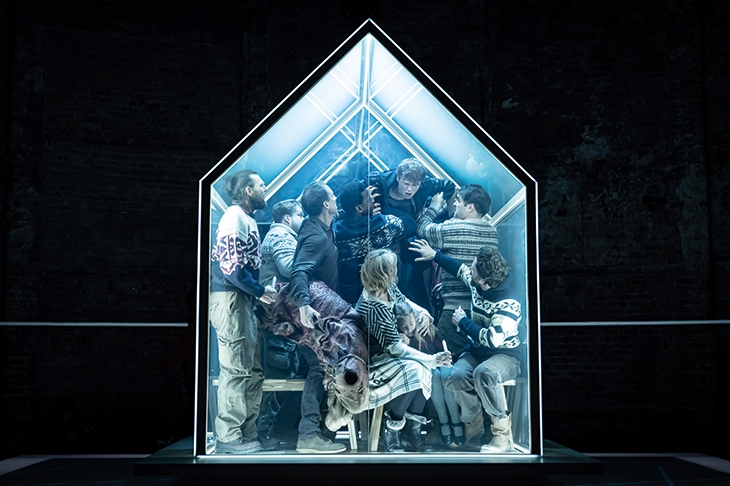Present Laughter introduces us to a chic, louche and highly successful theatrical globetrotter, Garry Essendine, whose riotous social life is centred on his swish London apartment. This is Noël Coward’s version of Noël Coward. In the script, from 1942, Coward alleges that his alter ego is being chased by three women. The in crowd would have laughed at the reference to Coward’s secret orientation but this version rather earnestly converts one of the females into a rugged Spanish male.
What for? Few scripts from the wartime era remain in the theatrical canon and one of the pleasures of seeing a vintage play is to examine the habits and conventions of a half-forgotten age. The director, Matthew Warchus, seems to assume that audiences today are narrow-minded bumpkins who can’t comprehend any morality but their own. And by forcing Garry out of the closet, Warchus stifles the play’s teasingly cynical atmosphere, and he removes a layer of emotional pain from the central character. Worse, he destroys the point of Roland Maule, a confused youngster whose clumsy attempts at seduction Garry brusquely rejects. This was another in-joke. Ardent male groupies such as Maule were exactly the kind of delicacy on which Coward regularly feasted.
The visual details in this production are confused as well. Telephones and other fittings are from the 1940s but many of the wigs and costumes look modern. Garry’s apartment is dominated by a huge installation, the brainchild of Rob Howell, that appears to soar above the stage like a blue-winged phoenix. Perhaps it draws too much attention to itself. Nevertheless, it looks stunning.
The action opens with Garry’s secretary, Monica, finding her boss’s latest conquest asleep on the sofa. Monica is usually played as a humourless old boot but Sophie Thompson transforms her into a sarcastic gossip who gets a laugh on every line. That’s not supposed to happen. Grouchy Monica and her dreary prattlings are intended to make Garry appear all the more sophisticated and dazzling as he swans in from the bedroom.
But when Andrew Scott (Garry) arrives, dressed as a pirate in velvet breeches and a wonky eyepatch, he looks like a strip-o-gram at the wrong address rather than the wittiest comedian in England. Later he changes into cricketing whites and gives a more credible account of highly strung British theatricality. Scott is especially good at finding the superstar’s isolation in the midst of his pointless social whirl but such contemplative moments are rare in this high-energy show which emphasises the vanity and silliness of Garry’s queeny circle. Indira Varma, the best-looking character wearing the best-looking costume, is the only figure whose suave detachment cuts against the general mood of frenetic hilarity.
I expect that Coward himself would have found this production shrill and even a little gauche but Warchus clearly made a decision to march the script into unexplored terrain. His attempt to turn it into a crowd-pleasing pantomime full of high farce and big laughs must be counted a success. No production can do more than hit the target it sets itself. Bravo.
Es Devlin’s set for The Hunt at the Almeida is the diametric opposite of Rob Howell’s tour de force at the Old Vic. The play is a simple morality tale that deals with an ugly modern problem — mob hate. Lucas, a divorced teacher living in a small Danish town, is falsely accused of molesting a six-year-old girl. Unless he can clear his name, he stands to lose his career, his freedom and his relationship with his teenage son. We know he’s innocent from the start, and that his accusers are deceived, and so the odds against him escaping a terrible injustice seem impossible. Yet because we share the community’s loathing of paedophiles we find ourselves rooting for both sides at once.
Devlin’s terrific design is nothing much to look at. A Perspex enclosure stands in the middle of the stage like an IKEA shed or a child’s drawing of a house. By a series of deft transformations, this innocuous cube is made to suggest a sauna, a classroom, a church, a hunting lodge, a club bar, an interrogation suite and, in the context of the drama, a potential prison cell. At the flick of a switch it can become translucent or opaque, and it might even stand for a tomb or a numinous emblem of ‘otherness’. I can’t recall seeing a theatrical device that does so much hard work within the narrative. I hope it wins prizes.
Tobias Menzies, as Lucas, gives a mesmerising performance playing a character who has no mesmerising qualities at all. Lucas is a sweet, decent, slightly damaged dad who finds himself ensnared in a web of toxic misanthropy. Director Rupert Goold seems to produce either duds or hits at the Almeida. No room for the so-so. This is one of the best of the best.







Comments